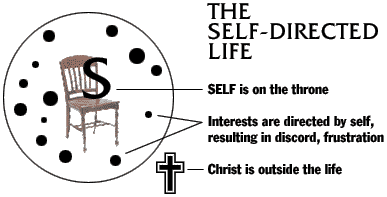1. God loves you and created you to know Him personally.
(references contained on this Home Page are linked to the actual verses from the Bible, and should be read in context wherever possible.)
God’s Love
“God so loved the world, that He gave His only begotten Son, that whoever believes in Him should not perish, but have eternal life” (John 3:16).
God’s Plan
“Now this is eternal life: that they may know you, the only true God, and Jesus Christ, whom you have sent” (John 17:3, NIV). What prevents us from knowing God personally?
2. Man is sinful and separated from God, so we cannot know Him personally or experience His love.
Man is Sinful
“All have sinned and fall short of the glory of God” (Romans 3:23). Man was created to have fellowship with God; but, because of his own stubborn self-will, he chose to go his own independent way and fellowship with God was broken. This self-will, characterized by an attitude of active rebellion or passive indifference, is an evidence of what the Bible calls sin.
Man is Separated
“The wages of sin is death” [spiritual separation from God] (Romans 6:23). “…(Those) who do not know God and do not obey the gospel of our Lord Jesus…will be punished with everlasting destruction and shut out from the presence of the Lord…” (2 Thessalonians 1:8,9)

This diagram illustrates that God is holy and man is sinful. A great gulf separates the two. The arrows illustrate that man is continually trying to reach God and establish the personal relationship with Him through his own efforts, such as a good life, philosophy, or religion – but he inevitably fails. The third principle explains the only way to bridge this gulf…
3.Jesus Christ is God’s only provision for man’s sin. Through Him alone we can know God personally and experience God’s love.
He Died in Our Place
“God demonstrates His own love toward us, in that while we were yet sinners, Christ died for us” (Romans 5:8).
He Rose From the Dead
“Christ died for our sins…He was buried…He was raised on the third day according to the Scriptures…He appeared to Peter, then to the twelve. After that He appeared to more than five hundred…” (1 Corinthians 15:3-6).
He is the Only Way to God

This diagram illustrates that God has bridged the gulf that separates us from Him by sending His Son, Jesus Christ, to die on the cross in our place to pay the penalty for our sins.
It is not enough just to know these truths…
4. We must individually receive Jesus Christ as Savior and Lord; then we can know God personally and experience His love.
We Must Receive Christ
“As many as received Him, to them He gave the right to become children of God, even to those who believe in His name” (John 1:12)
We Receive Christ Through Faith
“By grace you have been saved through faith; and that not of yourselves, it is the gift of God; not as a result of works that no one should boast” (Ephesians 2:8,9). When We Receive Christ, We Experience a New Birth (Read John 3:1-8.)
We Receive Christ by Personal Invitation
[Christ speaking] “Behold, I stand at the door and knock; if any one hears My voice and opens the door, I will come in to him” (Revelation 3:20).
Receiving Christ involves turning to God from self (repentance) and trusting Christ to come into our lives to forgive us of our sins and to make us what He wants us to be. Just to agree intellectually that Jesus Christ is the Son of God and that He died on the cross for our sins is not enough. Nor is it enough to have an emotional experience. We receive Jesus Christ by faith, as an act of our will.
These two circles represent two kinds of lives:


Which circle best respresents your life?
Which circle would you like to have represent your life?
The following explains how you can receive Christ:
You Can Receive Christ Right Now by Faith Through Prayer
(Prayer is talking with God)
God knows your heart and is not so concerned with your words as He is with the attitude of your heart. The following is a suggested prayer:
“Lord Jesus, I want to know You personally. Thank You for dying on the cross for my sins. I open the door of my life and receive You as my Savior and Lord. Thank You for forgiving me of my sins and giving me eternal life. Take control of the throne of my life. Make me the kind of person You want me to be.”
Did you pray this prayer?
Pray this prayer right now, and Christ will come into your life, as He promised.
How to Know That Christ Is in Your Life
Did you receive Christ into your life? According to His promise in Revelation 3:20, where is Christ right now in relation to you? Christ said that He would come into your life and be your friend so you can know Him personally. Would He mislead you? On what authority do you know that God has answered your prayer? (The trustworthiness of God Himself and His Word.)
The Bible Promises Eternal Life to All Who Receive Christ
“The witness is this, that God has given us eternal life, and this life is in His Son. He who has the Son has the life; he who does not have the Son of God does not have the life. These things I have written to you who believe in the name of the Son of God, in order that you may know that you have eternal life” (1 John 5:11-13).
Thank God often that Christ is in your life and that He will never leave you (Hebrews 13:5). You can know on the basis of His promise that Christ lives in you and that you have eternal life from the very moment you invite Him in. He will not deceive you.
An important reminder…
Do Not Depend on Feelings
The promise of God’s Word, the Bible – not our feelings – is our authority. The Christian lives by faith (trust) in the trustworthiness of God Himself and His Word.
This train diagram illustrates the relationship among fact (God and His Word), faith (our trust in God and His Word), and feeling (the result of our faith and obedience) (John 14:21).
The train will run with or without the caboose. However, it would be useless to attempt to pull the train by the caboose. In the same way, we as Christians do not depend on feelings or emotions, but we place our faith (trust) in the trustworthiness of God and the promises of His Word.
Now That You Have Entered Into a Personal Relationship With Christ
The moment you received Christ by faith, as an act of your will, many things happened, including the following:
1. Christ came into your life (Revelation 3:20 and Colossians 1:27).
2. Your sins were forgiven (Colossians 1:14).
3. You became a child of God (John 1:12).
4. You received eternal life (John 5:24).
5. You began the great adventure for which God created you (John 10:10; 2 Corinthians 5:17 and 1 Thessalonians 5:18).
Can you think of anything more wonderful that could happen to you than entering into a personal relationship with Jesus Christ? Would you like to thank God in prayer right now for what He has done for you?
By thanking God, you demonstrate your faith.
To enjoy your new relationship with God…
Suggestions For Christian Growth
Spiritual growth results from trusting Jesus Christ. “The righteous man shall live by faith” (Galatians 3:11). A life of faith will enable you to trust God increasingly with every detail of your life, and to practice the following:
- G Go to God in prayer daily (John 15:7).
- R Read God’s Word daily (Acts 17:11) – begin with the Gospel of John.
- O Obey God moment by moment (John 14:21).
- W Witness for Christ by your life and words (Matthew 4:19; John 15:8).
- T Trust God for every detail of your life (1 Peter 5:7).
- H Holy Spirit – Allow Him to control and empower your daily life and witness (Galatians 5:16,17; Acts 1:8).
The Importance of Baptism
The view of most evangelical Christian scholars is that salvation is by grace through faith alone. This is especially indicated by Ephesians 2:8-9, John 3:16, 1 John 5:1. It is important to understand that baptism is a result of salvation, not a cause.
There are different baptism methods. They may include the sprinkling of water over the head of the professing believer or the total immersion of the person under water (Greek: “Baptismo” = to immerse). However, the procedure is not as important as the individual’s understanding and motivation to seek baptism.
Some cite Mark 16:16 as their proof text that baptism is necessary for salvation, but they only quote the first half of the verse and typically leave out the second half, which indicates the necessity of belief as being the prerequisite to the salvation issue.
The way to resolve most problems pertaining to the issue of baptism is to look at the whole of Scripture. When we do, we find that there is absolutely nothing we can do as humans to earn salvation. Romans 6:23 tells us that salvation is a “free gift.” Free means that there is nothing we can do to deserve it. On the other hand, baptism is something we choose to do. If baptism or any other human work or activity (such as going to church regularly, going on a pilgrimage or visiting a “holy site”) contributed to our salvation, we could boast that we did something and contributed to our salvation. However, Scripture says that no one should boast before God Ephesians 2:8-9 .
We come to Christ though grace by faith, and our public baptism brings glory and honor to God. Baptism is an act of obedience, not to obtain salvation, but because of it — because we love Him and want to obey Him. The motivation to pursue baptism should originate from a desire to show to the world an outward demonstration of the person’s decision as well as the inward work the Holy Spirit has already begun in us. An unsaved person would not likely want to be baptized, because he would not have the Holy Spirit indwelling him to prompt his desire to follow Christ in obedience (unless a sect or cult group has erroneously taught him or her otherwise.) The fact that one even wants to be baptized (being assured that only faith alone in Jesus Christ saves) is evidence that the Holy Spirit already indwells that person, a result of being born of the Spirit by faith alone.
In the book of Acts, baptism is typically the outward response to coming to faith. It was seen as part of a process which includes: 1) hearing (or reading about) the gospel, 2) being convicted and led by the Holy Spirit to confess one’s sins (Greek: “Homologeo” = to agree with, to speak the same), 3) coming to faith in Jesus Christ as Savior, 4) beginning the progress of growth (which includes repenting from known sin), 5) joining a group of believers or church fellowship, and 6) being baptized. The last two parts are where there are different opinions among believers or churches.
Where some churches differ with what has been stated above chiefly centers on whether a person is saved if they have not been baptized (or if they have not been baptized the “right” way). In our understanding a person is saved when they put their faith in Christ. Of course, we all want them to join a church which exalts Christ and be baptized.
Fellowship In a Good Church
God’s Word admonishes us not to forsake “the assembling of ourselves together…” (Hebrews 10:25). Several logs burn brightly together; but put one aside on the cold hearth and the fire goes out. So it is with your relationship with other Christians. If you do not belong to a church, do not wait to be invited. Take the initiative; call the pastor of a nearby church where Christ is honored and His Word is preached. Start this week, and make plans to attend regularly.
Now that you’ve made your first step into the Kingdom of God, learn more about how to grow in your faith by visiting our Spiritual Growth page for new Christians.
Originally written by Dr. Bill Bright, co-founder, Campus Crusade for Christ, International. ©1965-2018, Bright Media Foundation.
Someone you know may need to read this. Please share.
